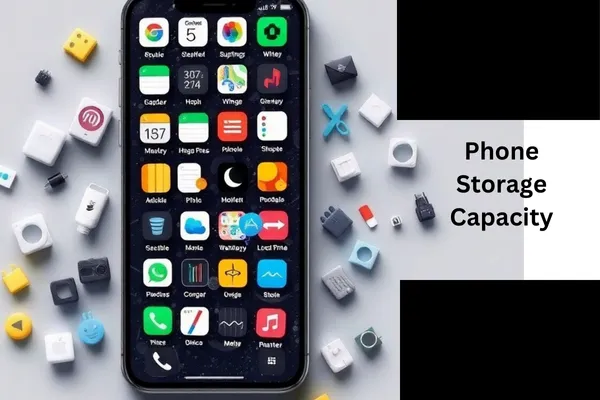
Storage Wars: How Much Phone Storage Do You Really Need in 2024?
"Your storage is almost full."
Few notification messages trigger more frustration than this one. Whether you're trying to capture an important moment, download a new app, or update your operating system, running out of storage can bring everything to a screeching halt.
But with phone storage options now ranging from 64GB to a whopping 1TB, how do you know what's right for you? Let's break down the perfect storage solution for every type of user in 2024.

Understanding Phone Storage Basics
Before deciding how much storage you need, it's helpful to understand what takes up space on your device:
Operating system: Typically requires 10-15GB
Apps: Can range from 50MB to 4GB each
Photos: 3-9MB per image (more for high-resolution)
Videos: 150-400MB per minute of 4K video
Music: About 2MB per minute of standard quality audio
Documents and messages: Generally minimal unless you store many files
The Different Storage Tiers Explained
Entry Level: 64GB-128GB
Perfect for: Light users who primarily use web-based services
What fits:
Operating system and updates
Essential apps (social media, banking, email, etc.)
A moderate photo collection (approximately 5,000 photos)
A handful of videos
Streaming music rather than downloaded playlists
Who should choose this: If you regularly offload photos to cloud storage, don't play graphics-intensive games, and primarily use streaming services rather than downloading media, 64GB might be sufficient. However, for slightly more peace of mind, 128GB offers a better value proposition in 2024.
Mid-Range: 256GB
Perfect for: Average users who take plenty of photos and use many apps
What fits:
Operating system and updates
A large collection of apps, including some larger games
Extensive photo library (15,000+ photos)
Several hours of high-quality video
Moderate music library with some downloaded playlists
Who should choose this: If you consider yourself an average smartphone user who takes lots of photos, enjoys mobile gaming occasionally, and likes having access to some media without an internet connection, 256GB provides a comfortable balance between price and storage capacity.
Premium: 512GB
Perfect for: Heavy users, content creators, and gamers
What fits:
Operating system and updates
Extensive app collection including multiple large games
Professional photo collection (30,000+ high-resolution images)
Several hours of 4K video footage
Large downloaded music library
Local backups and large files
Who should choose this: If you create content, play multiple storage-intensive games, or prefer keeping most of your data locally rather than relying on cloud services, 512GB provides abundant space without reaching the premium price of 1TB options.
Ultimate: 1TB
Perfect for: Professional content creators and power users
What fits:
Everything mentioned above, but in much greater quantities
Ability to shoot and store hours of 4K video without offloading
Multiple large games with high-resolution textures
Complete music libraries with lossless audio files
Professional apps with large data requirements
Who should choose this: If you use your phone as a primary content creation tool, need to store massive amounts of media locally, or simply never want to worry about storage management, 1TB is the gold standard—though it comes with a gold-standard price tag as well.
Beyond Physical Storage: Cloud Solutions
When considering how much phone storage you need, factor in cloud storage options:
Google Photos/iCloud Photos: Store unlimited photos and videos (though Google Photos now counts against your Google account storage)
Dropbox/Google Drive/OneDrive: Store documents and files in the cloud
Spotify/Apple Music/YouTube Music: Stream rather than download music
Netflix/YouTube/Streaming services: Stream videos instead of downloading
Cloud storage typically costs $1-3 per month for 100GB-200GB, making it an economical supplement to physical storage.
Special Considerations for Different Users
Photography Enthusiasts
If you capture thousands of photos but don't want to pay for the highest storage tier:
Use cloud storage with automatic backup
Select "Optimize iPhone Storage" or similar Android options
Consider whether you need to keep every photo at full resolution
Mobile Gamers
Modern games can consume anywhere from 1GB to 10GB+ each:
Premium games like Call of Duty Mobile require 2-3GB plus updates
Graphics-intensive games require substantial cache storage
Consider 256GB minimum if you play multiple large titles
Business Users
If you use your phone extensively for work:
Document-heavy workflows may benefit from more local storage
Consider your need for offline access to files
Factor in space for presentation materials and PDF storage
Budget-Conscious Buyers
To maximize value:
128GB typically offers the best price-per-gigabyte ratio
Consider whether the premium for higher tiers is worth it for your usage
Remember that cloud storage can be more cost-effective than paying for the highest physical storage tier
The True Cost of Insufficient Storage
Choosing too little storage can lead to:
Constant storage management stress
Missing important photo opportunities
Performance issues (phones slow down when nearly full)
Inability to update apps or operating systems
Premature device replacement
Decision Framework: A Phone Storage Buying Guide
Ask yourself these questions to determine your ideal storage capacity:
How long do you plan to keep your phone? Longer usage periods require more storage as your content accumulates.
Do you prefer local or cloud storage? If you have limited internet access or privacy concerns, local storage becomes more important.
What are your primary activities? Photo/video creation, gaming, and business use demand more storage.
What's your budget? Storage upgrades typically cost $50-$200 per tier.
Can you easily manage storage? If you're not tech-savvy, having extra space prevents headaches.
Conclusion
In 2024, here's my recommendation for most users:
Minimum acceptable: 128GB
Sweet spot for most users: 256GB
Peace of mind for heavy users: 512GB
Future-proof for content creators: 1TB
Remember, you can't add physical storage later (except on the few Android phones that still support microSD cards), so it's better to err on the side of having too much than too little.
